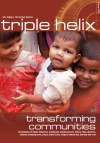Working with CMF
CMF's student ministry is vitally supported by an able and willing team of staffworkers and relay workers. Each staffworker covers a few medical schools in one geographical region, and supports local students and juniors' groups. Typical tasks include giving student talks, helping student leaders plan programmes, organising juniors' open house groups, and discipling key students one-to-one.
Usually staffworkers are part-time, working also in clinical medicine, and are paid for their CMF work on the same pay scale as primary school teachers. Relay workers are voluntary posts (unpaid) and form part of the UCCF training programme. They are usually full time but for six months or a year. They work only in one medical school, are supervised by a staffworker; and are usually immediately post-housejobs.
Origins
Although CMF has had travelling secretaries serving students in the past, the latest incarnation of CMF staffworkers started in 1996 when Dr Jim Paul arrived to assist Peter Saunders, who was then Student Secretary. Jim worked part-time in medicine and part-time for CMF for over two years. It didn't do his career any harm as he has since completed specialist training in palliative care, along with the Cornhill theological training course and an MA in Bioethics!
Expansion and growth
Currently we have four staffworkers and one relay worker dotted around the country. The most we've had on the go at any one time was seven. Altogether, about 20 doctors have worked as staffworkers, for between six months and three years. Most have been juniors, combining part-time medical training - usually as official NHS flexible trainees - with one or two days a week for CMF. One pair of London-based staffworkers even held down a medical SHO rotation as a two-year job share. Others are already fully trained doctors, working part-time in hospice medicine or general practice, often as flexible career scheme GPs.
Confessions of a staffworker
Becky Payne (nee Brain) worked as our South West staffworker for two and a half years until February 2005:
Being a staffworker was great. I grew loads spiritually and it was wonderful to see God at work in people's lives. At times it could be frustrating – my CMF supervisors seemed so busy and sometimes I felt guilty about ringing them! But, having said that, they always listened to my queries and gave me good advice.
Looking back I wouldn't change anything really. I'm glad I did it. Certainly it's given me a more holistic attitude towards medicine, and my presentation skills are so much better! As well as that, working for CMF during my GP training gave me more opportunities to think through the practical application of ethical issues we face as Christian doctors.
Since I finished as a staffworker, I've been busy getting married and am now about to become a mum! My only slight regret is that I'll still have half a year's further training to complete after my maternity leave; whereas, if I hadn't worked for CMF, I'd have been an established GP by now. On the other hand, working for CMF led to me meeting my husband Gareth, so I've a lot to thank the fellowship for!
Interested?
If you're interested in becoming a CMF staffworker, feel free to contact Peter Saunders, General Secretary, at [email protected].We can also arrange for you to talk to one of our current staffworkers so you'll get an honest insider's opinion of what it's really like!
Want to be more flexible?
Flexible training - for foundation years, SHO and SpR training, working at least 50% of full-time www.bma.org.uk
Flexible Career Scheme – for fully trained GPs and hospital doctors who wish to annualise their hours, working up to five sessions a week on average www.nhscareers.nhs.uk
How to juggle
During my school days I found fame (but not fortune) in a talent competition, juggling whilst eating a tangerine, an apple and a hardboiled egg - shell and all! Pretty impressive, you might say, if not a little weird. More than a decade on, my childhood hobby is now an integral part of my life. But I've swapped the fruit and veg for more challenging juggling equipment: two parttime jobs (GP registrar and CMF Student Secretary); marriage to an equally busy doctor; keeping up with our young daughter Zoe; and the usual postgraduate exam struggles.
How it all started
I got involved with CMF as a first year medical student on the students'coordinating committee (SCC), then joined the Nucleus editorial committee, ending up as student editor. After house jobs in London I applied for a GP vocational training scheme, but didn't get on. Though disappointed, I stopped to think and took the opportunity to work for CMF as a London staffworker full time for six months. After this I went back and did an A&E SHO job, during which time our daughter was born. After my wife Rachael's maternity leave I had some fun as a house-husband for six months alongside, you've guessed it, squeezing in a bit more work for CMF. It wasn't unknown for me to give a student talk with Zoe slung round my shoulders in a papoose.
In for the long haul
During that time I applied to be CMF Student Secretary. It was a big decision as I knew it would mean committing to CMF for a substantial period of time, which would affect all of us.We decided that I should remain part-time in medicine, largely as I had not worked long enough as a doctor at that point to keep my 'street cred' with medical students and junior doctors for very long should I decide not to continue. Both Rachael and I applied for flexible training (me because of CMF, Rachael because of childcare) and in the Lord's providence this was during a fairly brief period when the London Deanery flexible training budget was flush with cash.We were each accepted and before long I was starting as CMF Student Secretary, whilst continuing to build up SHO experience suitable for general practice.
I have now been working in this arrangement for three and a half years and although looking for a successor as Student Secretary, I have no plans to stop the current medical/CMF juggling act and aim to move to a different role within CMF.
Pros and cons
There have been many positive sides to my chronically split personality. For a start, working in the NHS has kept my feet firmly on the ground. I have gained valuable practical insight and experience with the ethical issues that I speak or write about for CMF. Conversely, my CMF work has had a positive effect on my medicine. I have been constantly challenged to maintain high standards, practically and ethically, as well as take opportunities to share my faith, as I have no desire to be a hypocrite after urging others to do the same with my CMF hat on!
I have been forced to focus more and be disciplined about how my time is spent. There are so many things I would like to do in both sides of my work, but this is impossible, so I regularly have to decide which of many good things should be prioritised and which can be delegated or left.
There have been tensions also. I often feel torn between my two lives and can end up thinking that I am doing neither of them sufficient justice, as either job could very easily satisfy more than a full-time commitment. An over-full diary has led to many weeks when either I ran out of ends at which to burn the proverbial candle, or else forgot to notify someone (usually my wife) of some impending important event.
Overall I think that maintaining a life outside of medicine has been a sanity booster, and it has certainly kept me from becoming jaded with the NHS rat race, a fact that has been noted by more than one of my consultants.
Just say 'no'
So what can be done when two big parts of your life are in regular collision? Be realistic with your goals and plan ahead. Regularly reassess your priorities and delegate areas of responsibility to others. Learn to say 'no' without feeling guilty - in a busy life with little slack, saying 'yes' to one thing automatically implies saying 'no' to others.
Colourful career path
Looking back there aren't many things I'd change. Of course I have learnt lessons and made mistakes, but I love combining my work for CMF with my medical training. It's given me a colourful career path and lots of valuable experiences, as well as the joy of seeing students grow in their knowledge of God and their ability to apply his commands to their daily lives and future career decisions. I'm still learning, but the journey is an exciting one.
































